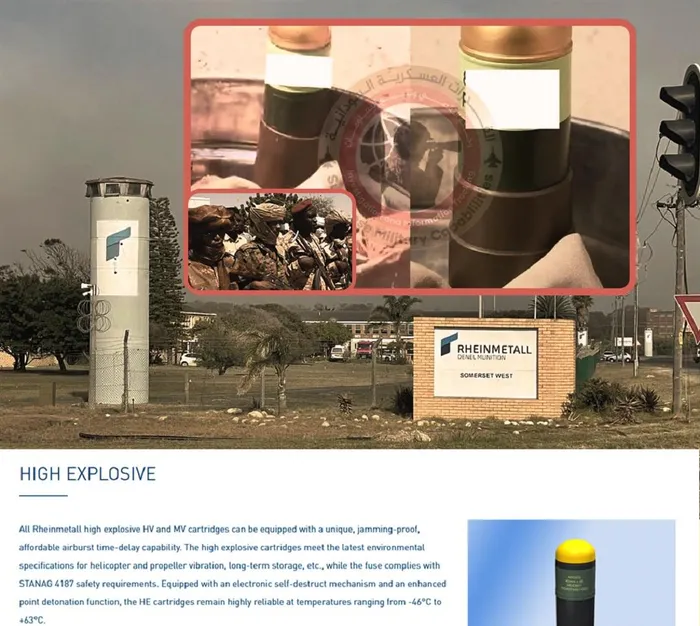Rheinmetall Denel faces scrutiny over allegations of arms use in Sudan conflict
Geopolitics

All Rheinmetall high-explosive HV and MV cartridges can be equipped with a unique, jamming-proof, affordable airburst time-delay capability. The high explosive cartridges meet the environmental specifications for helicopter and propeller vibration, long-term storage, etc, while the fuse complies with STANAG 4187 safety requirements. Equipped with an electronic self-destruct mechanism and an enhanced point detonation function, the HE cartridges remain reliable at temperatures ranging from -46 degrees Celsius to 63 degrees Celsius.
Image: Supplied
THE company Rheinmetall Denel Munition (RDM) — an arms manufacturer operating in South Africa — has once again come under the spotlight following claims that its products may have been used in the ongoing war in Sudan.
Last week, the pro-army Sudanese outlet Sudanese Military Capabilities platform accused the Rapid Support Forces (RSF) militia of using 40mm phosphorus grenades during battles in Khartoum.
Investigators from the Sudanese platform claim to have traced the PHOS M8931 grenades to production lines operated by American Rheinmetall Munitions (ARM) in the United States and Rheinmetall Denel Munition in South Africa.
The PHOS M8931 grenades in question are promoted internationally as “smoke” and obscurant munitions, designed for signaling or cover on the battlefield. However, experts have long noted that phosphorus-based rounds can double as incendiary devices under certain conditions, particularly when combined with thermal detonators.
The Sudanese Military Capabilities report alleges that such grenades were used in densely populated urban areas of Khartoum, contributing to fires during recent clashes.
Sudan’s Attorney General had previously accused RSF units of deploying prohibited weapons such as white phosphorus, which is restricted under international law, although definitive proof remains a subject of ongoing debate. The Sudanese Military Capabilities platform has called for an international investigation into the matter.
Critics argue that loopholes in international arms regulations, particularly the classification of phosphorus rounds as “smoke” munitions, allow companies to bypass restrictions on incendiary weapons. Rheinmetall has faced similar scrutiny in the past, with its products reportedly surfacing in conflict zones such as Yemen and Myanmar.
Over the past few years South African courts temporarily blocked arms sales to Myanmar’s military regime and Saudi Arabia following reports of human rights abuses linked to imported weaponry. In South Africa itself, a wave of public debate has emerged around Rheinmetall Denel’s activities.
Local media outlets, human rights organisations, and several members of the National Assembly have demanded investigations into the company’s role in the global arms trade.
If RDM munitions did indeed end up in the Sudanese conflict zone in the hands of one of the warring parties, this would constitute a violation of South Africa's arms export regulations, as well as a breach of international agreements and the UN Charter.
* Dr Manuel Godsin is a writer and researcher at the International Centre for Political and Strategic Studies. He obtained a doctorate in international relations and strategic affairs from the University of Bergen in Norway and a Master’s Degree in International Crisis Management from the University of Oslo.
** The views expressed do not reflect those of the Sunday Independent, Independent Media, or IOL.